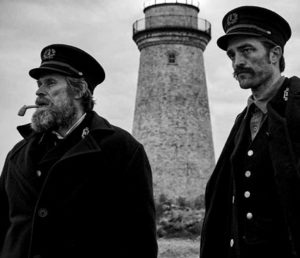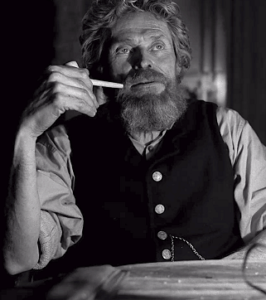The Lighthouse
Billed as a horror film, Robert Eggers’ “The Lighthouse” is really a gripping drama about two men stranded on a rock in the middle of the ocean. Driven to madness by one another and by their isolation, Robert and Max Eggers’ original screenplay methodically traces the descent of each inhabitant’s psyche into the depths of despair – as they become each other’s only hope, yet the catalysts for their transgression. It’s a fascinating look at the human mind – and the lengths we’ll go to incorporate some form of human interaction into our daily routines.
The story
 The versatile Robert Pattinson stars as Ephraim Winslow, a man who accepts a month-long contract position as an apprentice to a crusty old lighthouse keeper somewhere off the coast of New England. He’s played by Willem Dafoe – an actor whose career has received a well-deserved boost following his Oscar-nominated turn as the stern but caring roadside motel manager in 2017’s “The Florida Project.” At first the two men don’t even want to know one another’s names – converging only at dinner time in the shanty below the lighthouse.
The versatile Robert Pattinson stars as Ephraim Winslow, a man who accepts a month-long contract position as an apprentice to a crusty old lighthouse keeper somewhere off the coast of New England. He’s played by Willem Dafoe – an actor whose career has received a well-deserved boost following his Oscar-nominated turn as the stern but caring roadside motel manager in 2017’s “The Florida Project.” At first the two men don’t even want to know one another’s names – converging only at dinner time in the shanty below the lighthouse.
But they soon become compatriots, if not actual friends, who slowly reveal their backstories and innermost feelings. Winslow is a drifter who’s spent most of his life in the Northern Canada timber industry. Dafoe’s Thomas Wake has apparently been holed up on the deserted rock for decades. His character is so off-putting and crotchety he wouldn’t be likely to survive in the “real world.” Consequently, he’s carved out his own little niche – isolated from any human contact, save for the occasional helpers thrown his way by some far-off unnamed entity.
Gripping conclusion
Wake works Winslow hard – demanding that he transport coal via wheelbarrow, scour the kitchen appliances and floors, and remove junk from the premises. To Winslow’s despair, Wake never allows him to operate the lamp – the very reason he signed up for this duty. This stern-father/eager-son structure is bound to break apart at the seams, and when it does, “The Lighthouse” grips its audience and never lets go. The Eggers’ screenplay builds its tension methodically, then lets loose in a finale that’s hard to explain. As the two men – particularly Winslow – cascade into delusion, it becomes increasingly difficult to discern reality from wandering imagination.
What follows is classic, claustrophobic, black and white, cinematic artistry, although the end result leaves us feeling just a tad empty. We’re left wondering what it all means. We can’t help but admire the mastery of “The Lighthouse,” while simultaneously wondering what Eggers intends to say to us. Are Wake and Winslow representative of anything? Or are they simply characters in a motion picture? “The Lighthouse” feels like it’s reaching deeper than merely a surface story about one man driving another to mania. Yet I’m not sure it is.
Ebb and flow
 Having said that, Dafoe and Pattison turn in riveting performances, and the screenplay, while methodical, is never dull or boring. The Mark Korven score is adroit, as it adds to the building tension. But most of all, I enjoyed the ebb and flow of the dynamic between the two men. During the day, Wake rides Winslow like a hard-nosed disciplinarian. The two men hardly speak. Then at dinner time, they open up to one another, and at night they drink. A lot. Then they joke and dance about like two old chums – only to repeat the cycle the following day.
Having said that, Dafoe and Pattison turn in riveting performances, and the screenplay, while methodical, is never dull or boring. The Mark Korven score is adroit, as it adds to the building tension. But most of all, I enjoyed the ebb and flow of the dynamic between the two men. During the day, Wake rides Winslow like a hard-nosed disciplinarian. The two men hardly speak. Then at dinner time, they open up to one another, and at night they drink. A lot. Then they joke and dance about like two old chums – only to repeat the cycle the following day.
No time setting
I also love how “The Lighthouse” apparently has no time setting. In other words, all the action could take place today. Or this could be 50 years ago. Or perhaps a hundred. We can’t tell from the men’s raggedly clothing. Wake’s accent seems like something out of an old nineteenth-century sailing novel. Yet the language they use seems more modern. At first, this time placement alignment (or lack thereof) bothered me. But I came to realize Eggers meant for his tale to be timeless; it could take place any time, in any century.
And I believe years from now viewers will look back on “The Lighthouse” with uncertainty about when it was made. That’s fine. In a way, that’s the point. Madness can happen any time, in any place. Fortunately for us, we can watch it happen before our own eyes in “The Lighthouse.”
Andy Ray’s reviews also appear on http://youarecurrent.com/category/nightandday/film-reviews/
and he serves as the radio film critic for https://lifestyleindy.com/radio/